The Intel Core i9-9900K at 95W: Fixing The Power for SFF
by Ian Cutress on November 29, 2018 8:00 AM ESTCPU Performance: Encoding Tests
With the rise of streaming, vlogs, and video content as a whole, encoding and transcoding tests are becoming ever more important. Not only are more home users and gamers needing to convert video files into something more manageable, for streaming or archival purposes, but the servers that manage the output also manage around data and log files with compression and decompression. Our encoding tasks are focused around these important scenarios, with input from the community for the best implementation of real-world testing.
All of our benchmark results can also be found in our benchmark engine, Bench.
Handbrake 1.1.0: Streaming and Archival Video Transcoding
A popular open source tool, Handbrake is the anything-to-anything video conversion software that a number of people use as a reference point. The danger is always on version numbers and optimization, for example the latest versions of the software can take advantage of AVX-512 and OpenCL to accelerate certain types of transcoding and algorithms. The version we use here is a pure CPU play, with common transcoding variations.
We have split Handbrake up into several tests, using a Logitech C920 1080p60 native webcam recording (essentially a streamer recording), and convert them into two types of streaming formats and one for archival. The output settings used are:
- 720p60 at 6000 kbps constant bit rate, fast setting, high profile
- 1080p60 at 3500 kbps constant bit rate, faster setting, main profile
- 1080p60 HEVC at 3500 kbps variable bit rate, fast setting, main profile
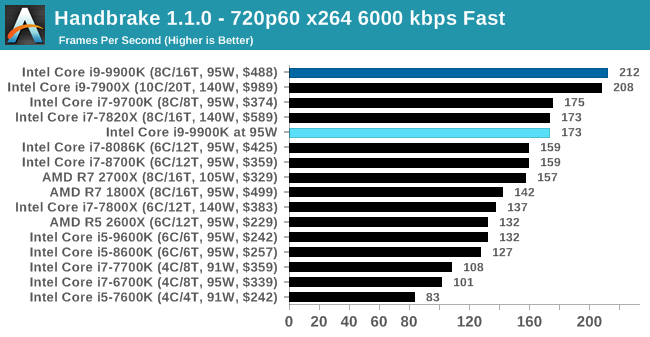
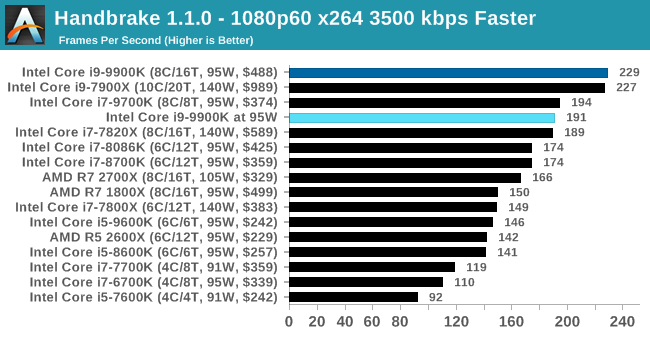
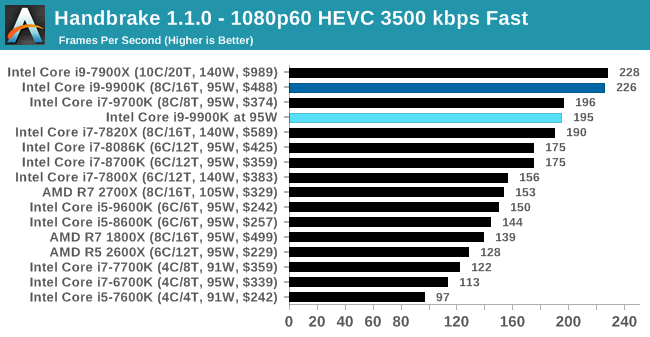
Encoding is a good example where the performance decreases by a noticable margin (10%+), although perhaps not as much as you might think. In all of our tests however, the 95W mode again pulls the 9900K down to the level of a 9700K. This pattern goes through all of our encoding tests.
7-zip v1805: Popular Open-Source Encoding Engine
Out of our compression/decompression tool tests, 7-zip is the most requested and comes with a built-in benchmark. For our test suite, we’ve pulled the latest version of the software and we run the benchmark from the command line, reporting the compression, decompression, and a combined score.
It is noted in this benchmark that the latest multi-die processors have very bi-modal performance between compression and decompression, performing well in one and badly in the other. There are also discussions around how the Windows Scheduler is implementing every thread. As we get more results, it will be interesting to see how this plays out.
Please note, if you plan to share out the Compression graph, please include the Decompression one. Otherwise you’re only presenting half a picture.
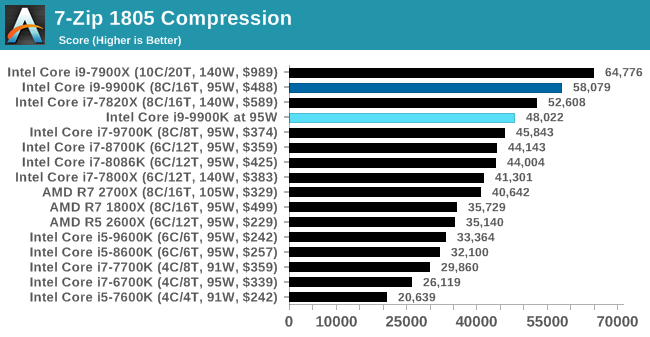
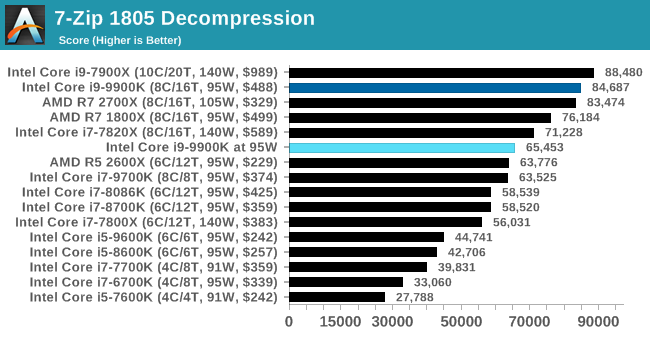
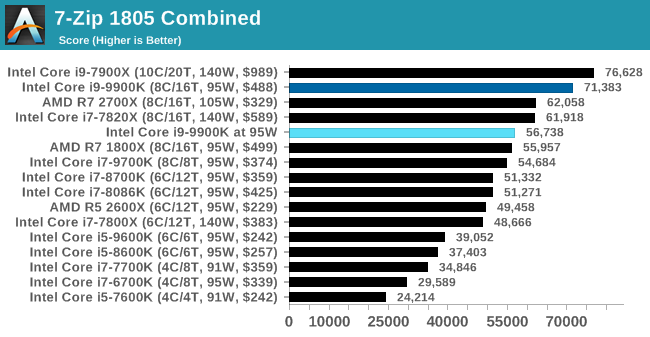
WinRAR 5.60b3: Archiving Tool
My compression tool of choice is often WinRAR, having been one of the first tools a number of my generation used over two decades ago. The interface has not changed much, although the integration with Windows right click commands is always a plus. It has no in-built test, so we run a compression over a set directory containing over thirty 60-second video files and 2000 small web-based files at a normal compression rate.
WinRAR is variable threaded but also susceptible to caching, so in our test we run it 10 times and take the average of the last five, leaving the test purely for raw CPU compute performance.
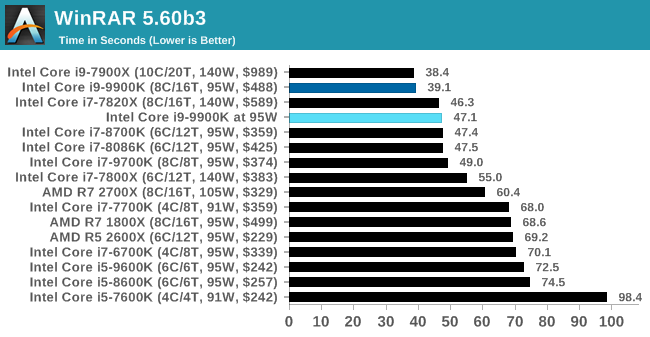
AES Encryption: File Security
A number of platforms, particularly mobile devices, are now offering encryption by default with file systems in order to protect the contents. Windows based devices have these options as well, often applied by BitLocker or third-party software. In our AES encryption test, we used the discontinued TrueCrypt for its built-in benchmark, which tests several encryption algorithms directly in memory.
The data we take for this test is the combined AES encrypt/decrypt performance, measured in gigabytes per second. The software does use AES commands for processors that offer hardware selection, however not AVX-512.
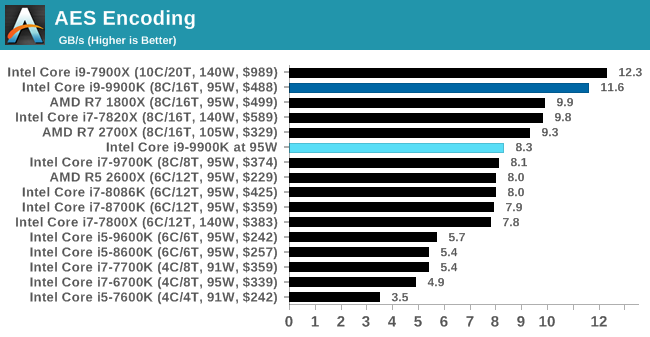










101 Comments
View All Comments
TechSideUp - Sunday, December 2, 2018 - link
Can you show me where your getting this i9-9900k for $488? Lolpeevee - Monday, December 3, 2018 - link
" Alex Yee, a researcher from NWU and now software optimization developer, that I realized that he has optimized the software like crazy to get the best performance."What CPU he optimized it for? Let me guess... the one he has in his room.
tviceman - Monday, December 3, 2018 - link
I'd like to see what kind of performance gains may be had with an undervolt when TDP limited.TheJian - Tuesday, December 4, 2018 - link
I think people are confusing WATTS USED with TDP (amount of HEAT a chip puts off that your HSF or case etc has too be able to accommodate to cool said chip). They are telling manufacturers of laptops, pc's etc how good their cooling design needs to be to keep the chip from heating up.THERMAL DESIGN POWER (point might be more accurate, as some use it), is just as it sounds. THERMAL, er, uh, HEAT. Get it? I'm confused by everyone's confusion...LOL.
https://www.windowscentral.com/what-tdp-and-why-sh...
Perhaps a bit better explanation than anandtech is providing. Maybe they need an A+ course?
"TDP ≠ power draw?"
"Not quite, no. TDP doesn't equate to how much power will be drawn by the component in question, but that doesn't mean you can't use the value provided as an estimation."
"TDP is not — however — a direct measure of how much power a component will draw, but it can be a good indicator."
So, don't expect watts PULLED from a wall to equal a quoted TDP. That isn't what it is, although it may come close to meaning it...ROFL.
If you had a 100% efficient chip (as someone else noted isn't possible...yet?), your chips TDP rating would be ZERO. It would not require anything to cool it. See the point?
https://en.wikipedia.org/wiki/Thermal_design_power
"The thermal design power (TDP), sometimes called thermal design point, is the maximum amount of heat generated by a computer chip or component (often the CPU or GPU) that the cooling system in a computer is designed to dissipate under any workload."
Not exactly watts used right?
https://fullforms.com/TDP
"What does TDP mean?
Thermal Design Power (TDP), sometimes called Thermal Design Point, is a metric that is expressed in watts. TDP refers to the amount of power/heat a cooling system (like fan, heatsink) is expected to dissipate to prevent overheating."
Again, not watts used. I could point to another dozen, but people should get the point. Despite whatever Intel/AMD think it means year to year (ROFL), it's heat.
https://www.overclockers.com/forums/showthread.php...
Same story from OC people. To each his own I guess, but many seem confused about why things blow past tdp (because it's not WATTS). What is the chips temp when it blows past those TDP numbers at stock settings? Is it 150 instead of 95 or whatever? I mean if Dell or someone designs their slim pc's for 95w it likely won't work to well if it's going to 150 temps with a box that is designed to cool 95-100w right? Again, the definition used here really don't work IMHO (and everyone else I seem to look up...LOL). But hey, maybe my old A+ test was wrong (I'm old, maybe I'm just not recalling things correctly, and all the web is wrong too) :) I doubt it ;)
Gastec - Wednesday, June 19, 2019 - link
Perpetuum mobile IS impossible. And I don't want a CPU that's advertised as consuming 95W to 110W (give more than take the PSU inefficiency and other losses on the pipe) to automatically overclock to 170 W because of review benchmarks. I want it to be set BY DEFAULT at max. 95-110W and I also want it to do 5GHz on all cores @ 95-110W, as advertised:) Then I would pay 490€ for it.DennisBaker - Tuesday, December 4, 2018 - link
I wanted to build a new PC on Black Friday, and I bought an i9-9900k. I never overclock and typically buy a locked/non-k CPU but couldn't wait until next year. I also always use a SFF case (Cooler Master Elite 130).This is a great article, but I'm not sure how to actually set the bios for a 95w max cpu setting.
I have the Asrock z390 phantom gaming-itx/ac motherboard:
http://asrock.pc.cdn.bitgravity.com/Manual/Z390%20...
I've been googling without success and figured I would just ask here if there is a general guide for this.
DennisBaker - Tuesday, December 4, 2018 - link
Set to:Long Duration Power Limit: 95
Long Duration Maintained: Auto
Short Duration Power Limit: 95
Seems like that should work.
0ldman79 - Thursday, December 6, 2018 - link
I guess the 95w limit prevented whatever resource snag or thermal throttling issues that was happening with the unlimited version.That would explain the benches where it won vs the unlimited 9900k.
HikariWS - Thursday, December 13, 2018 - link
Great article! I've been guessing about turbo values for years and this aticle answered it all!!Of course we need more transparency from Intel, I suppose this info is left for marketers to release and they think we'd not understand, so they just leave it hidden.
It's great how the same chip can be used on a small form factor and on a big E-ATX case. Modern turbo makes manual overclocking almost not needed, left for watercooling or maybe some manual Vcore setting.
It's basicly a matter of having a good case, a great cooler, and live in Europe to be able to keep 4700MHz all the time!
I wish Intel would release a top performing CPU with 4 core and no IGP, that would do 4.5GHz base and 5.5GHz All Core Turbo without watercooling. We don't need more than 4 cores.
misources - Sunday, May 10, 2020 - link
Nice article about Intel Core i9. please visit my site for more tutorial www.misources.com